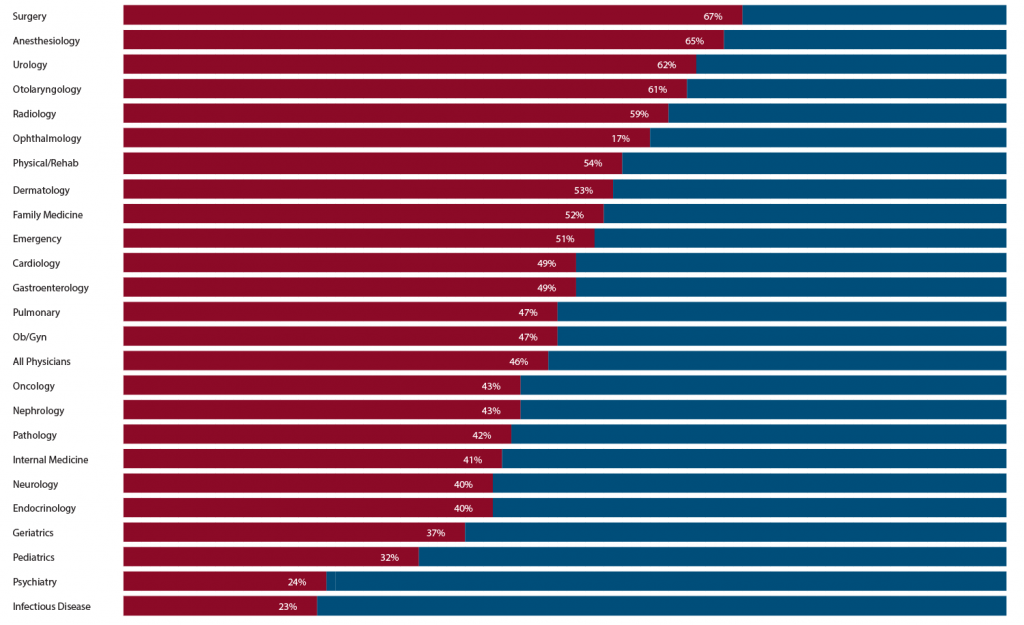A recent headline published in the opinion section of The New York Times reads: “Doctors Should Tell Their Patients to Vote.” (Published October 20, 2018). But, according to the most recent data, physicians may need to give themselves a dose of their own medicine and remember to vote themselves.
Results from a study that looked at physician voting between 1996 and 2002 found that physicians vote far less often than the general population (J Gen Int Med. 2007;22:585–589). “When accounting for factors such as level of education and income, voter turnout was approximately 20 percentage points lower for physicians than lawyers and approximately 10 percentage points lower than the general population, said lead author David T. Grande, MD, MPA, associate professor of medicine, Senior Fellow at the Leonard Davis Institute of Health Economics and a co-director of the National Clinician Scholars Program at the University of Pennsylvania in Philadelphia. “Though we don’t have new data, I hope physician voting rates have improved since we looked at this question more than a decade ago,” he said.
While it is not clear how often doctors have voted in more recent elections, Dhruv Khullar, MD, MPP, an attending physician at New York-Presbyterian Hospital and researcher at the Weill Cornell Department of Healthcare policy and Research in New York City, said, “We’ve seen an upswing in the number of physicians running for office and pursuing other forms of civic engagement.” Specifically, political engagement by physicians has increased in terms of those who now sit in Congress: As of January 2017, 15 physicians are among the members of the 115th U.S. Congress.
Both Drs. Grande and Khullar emphasized the current influence of politics and policy on healthcare—an issue many Americans rate as a top priority—may drive more physicians to become engaged in politics, whether by voting or through other types of civic engagement. “It’s become increasingly clear to physicians that laws and policies really do affect how we’re able to care for patients, so it’s important to speak up for our patients and for ourselves,” said Dr. Khullar.
“We don’t know why physicians vote less often than expected,” said Dr. Grande. “It may be that they view voting as being unimportant relative to their professional work and obligations or that their busy schedules get in the way.”
Dr. Khullar also highlighted these points: “It’s possible that it’s difficult for [physicians] to get to the voting booth without protected time, or that caring for patients fulfills their sense of social purpose such that other forms of civic engagement sometimes seem less important.”
Medical Student Participation
A recent survey of medical students who were conducting clinical rotations during the last election cycle support some of these points (STAT. October 8, 2018).The primary reasons medical students cited for not voting were lack of time and demanding schedules and expectations that precluded them from leaving their clinical obligations to head to the polling station, and a lack of basic knowledge about the process of voting (e.g., how or when to register, change of residence, applying for absentee ballots).
The study authors called for a “cultural shift,” in which physicians view voting as a natural extension of their obligations to their patients. “Engineering this shift,” wrote the authors, “begins with promoting civic engagement among trainees—medical students, interns, residents, and fellows—because they are the future of the profession.”
Mary Beth Nierengarten is a freelance medical writer based in Minnesota.
Political Leanings Among Physicians
Recent data show that physicians are basically divided evenly on identifying as Democrat or Republican, with certain specialties leaning as a group more toward one party or the other (New York Times. October 6, 2016).
Party Registration, by Specialty
Physicians in Congress, By the Numbers
- 25 physicians served as members of Congress between 1960 and 2004, accounting for less than 1% of the elected body.
- 27 physicians have been elected to Congress between 2005 and 2015
- 15 physicians now serve in the 115th U.S. Congress.
- 10% of the signers of the Declaration of Independence were physicians
- 5% of members of the first 100 years of Congress were physicians.
Sources: JAMA. 1983;249:929–930; JAMA. 2004;292:2125–2129. South Med J. 2015;108:657–561.
